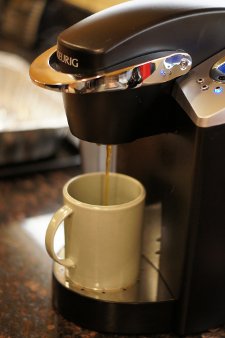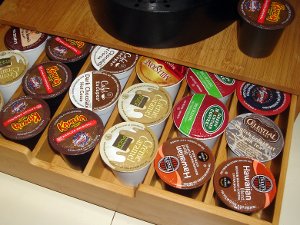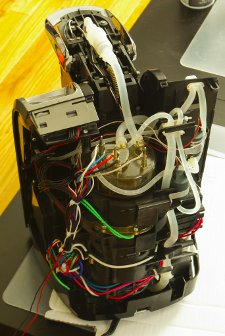Keurig K-Cups and Tea
Web: www.keurig.com | Wikipedia: KeurigLast Updated: Jan. 28, 2014Keurig is a brand of brewing machine, which can be used for coffee, tea, and other drinks, but is most commonly used for coffee. Keurig brewing machines use pre-packaged cups called K-Cups. The Keurig brand and brewing system is wholly owned by Green Mountain Coffee Roasters.
This article explains why the Keurig/K-Cup system is not ideal for tea: it is expensive, poor for sustainability, and not suited for brewing high-quality teas.
The Keurig/K-Cup system works by forcing hot water through the K-Cup packs. K-Cups are used only once, and then are disposed of, although reusable K-cup strainers do exist, which can be used for brewing coffee grounds or even loose tea.
Price and Cost Per Cup
Teas in K-Cups are more expensive than even award-winning artisan teas.
K-cups are extremely expensive relative to even high-end artisan teas. For example, as of browsing the Green Mountain Coffee online store October of 2013, most 24-serving boxes of K-cups from mainstream tea brands like Bigelow and Celestial Seasonings cost $15.49, yielding a cost-per-cup of over 64 cents. By contrast, tea bags from Bigelow and Celestial Seasonings typically retail for around $3 for a box of 20 teabags in a typical supermarket; the cost-per-cup here is only 15 cents.For these brands, K-cups cost over 4 times as much. However, this difference does not take into account that most tea bags can be resteeped or brewed with multiple infusions, whereas K-Cups cannot. If you steep your tea bags twice, the cost difference is larger than a factor of eight.
In the world of coffee, K-Cup costs significantly more than single-origin artisanal coffee.[1] The same is true for tea.
It is rare for loose-leaf teas to cost more than $300 a pound, and these teas are nearly always able to make multiple infusions; in these cases, the K-Cups above would be more expensive than even these high-end artisan teas. Most loose-leaf artisan teas, even high grades, cost under $100 a pound, which, using a generous 2.5 grams of leaf per cup of tea, yields a cost-per-cup of around 55 cents even if making a single steeping. Most loose-leaf tea is much cheaper, with some teas having cost-per-cup of less than 5 cents.
The Keurig machines also are expensive, typically starting around $90 for the simplest systems and reaching well over $200.
A poor choice for sustainability
Keurig, together with Green Mountain Coffee, markets themself as an environmentally-friendly company, supporting efforts such as fair trade and the rainforest alliance.[2] However, the whole idea of the Keurig brewing system and K-Cups is a move away from the direction of sustainability, when considering the packaging and waste generated by the system, and that this waste is entirely unnecessary, because numerous other brewing methods, whether for coffee and tea, generate significantly less waste.The packaging of K-cups includes plastic, and aluminum lids. Although they are presented as "recyclable" and the contents of used cups are compostable, in practice they are nearly always thrown in landfills. Lloyd Alter of Treehugger asks a tough question, marvelling at "why people would pay more to lock themselves into a proprietary coffee brewing system that generates a ton of garbage".[3]
Brewing method and quality concerns
Samantha Cappuccino-Williams on TeaMuse describes K-cup tea as undrinkable, pointing out that they are essentially instant teas. Using a reusable K-cup filter in the machine may produce better results than these instant products, but is still not ideal.The pre-packaged K-cups of teas sold through Green Mountain coffee have been specifically designed for use with the Keurig brewing method. In general, using this brewer in the reusable filters with your own loose-leaf tea will produce inferior results than preparing this tea through traditional methods.
There are several factors that limit the usefulness for brewing tea using Keurig coffee machines. The brewing method, forcing hot water through the K-cup pack, is very different from the method normally used to brew tea, adding the element of pressure, which is absent in other brewing methods. This method is better suited to finely broken teas, like CTC tea, fannings or dust, which are usually considered low grades of tea. Whole leaf teas do not fare as well, and green teas can be particularly problematic.
Brewing temperature can also be a problem. The default temperature for Keurig brewers is of 192°F (89°C), which is generally not ideal for most types of tea. Most black teas taste best when brewed with boiling water, and many green teas taste best with lower temperature water, in the 160°-170°F (71°-82°C) range. The newer Keurig Vue, which is not backwards compatible with K-Cups, has adjustable temperatures which can address this issue, but this newer system is currently unpopular and not widely in use.
Getting the most out of preparing loose-leaf tea using reusable K-cups is an art or skill, something that requires experimentation. If you are going to invest effort into developing skill and comfort preparing loose-leaf tea, we recommend focusing on more traditional methods like using a tea strainer or teapot.
We do not list or endorse K-cups.
At RateTea, we do not list K-Cup teas for rating or review, nor do we list brands that exclusively sell K-Cups or other similar instant tea products, in large part because these products remove the element of brewing and tea preparation, which we consider an integral part of reviewing teas. You can read more of our full explanation of what types of companies we do and don't list.We also do not recommend purchasing Keurig machines or K-Cups. The cost-per-cup is very high, and the extra money goes towards an industrial process and profit for the producers and sellers of K-cups rather reaching the producers of tea and coffee. These instant products push tea culture away from the direction of artisan teas and appreciation of nuance, and are in conflict with our goals of helping people develop their appreciation of tea and promoting sustainability in the tea industry.
Alternatives to Keurigs and K-Cups for Tea Drinkers
Loose-leaf tea remains the gold standard both for people looking for the most savings and lowest cost-per-cup, as well as for people hoping to experience the full richness of the best artisan teas. We recommend a variety of tea infusers for people who wish to become more comfortable with buying and preparing loose tea.Tea bags, even though more expensive and less sustainable than loose tea, still represent an improvement over K-cups. Tea bags offer a reasonable balance or compromise between cost, quality, and convenience, and are a good choice for people who place the highest priority on convenience.
References
1. Single-Serve Brewers Make Convenience Costly, New York Times, Feb. 7, 2012.
2. Sustainability | Keurig, Retrieved Jan. 24, 2014.
3. Lloyd Alter, Keurig And Other Coffee Pods Piling Up In Landfills Across America, Treehugger, Feb. 28, 2012.




